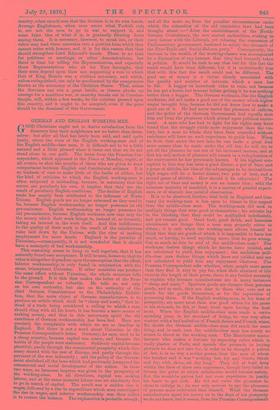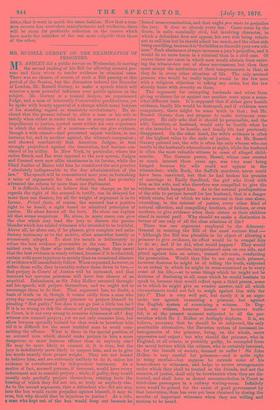GERMAN AND ENGLISH WORKING-MEN.
GOOD Christians ought not to derive satisfaction from the discovery that their neighbours are no better than them- selves ; but after all that has lately been said, and said quite justly, about the vices of the English working-man and of the English middle-class man, it is difficult not to be a little amused and a little pleased when it turns out that we do not stand alone in our guilt. The letter from the Prussian Cor- respondent, which appeared in the Times of Monday, ought, at all events, to shut the mouths of those who are given to draw comparisons between English and Continental artisans. It is no business of ours to make little of the faults of either, but the kind of criticism to which the English working-man is often subjected is misleading, because, in assuming that his errors are peculiarly his own, it implies that they are the result of peculiarly English conditions. The decline of English trade has usually been attributed to the influence of Trade Unions. English goods are no longer esteemed as they used to be, because English workmanship no longer possesses its old pre-eminence. English workmanship no longer possesses its old pre-eminence, because English workmen now care only for the money which their work brings in, instead of, as formerly, taking an interest in the work itself. And this indifference to the quality of their work is the result of the mischievous rules laid down by the Unions, with the view of making empleyment for more hands. England is the paradise of Unionism,--consequently, it is not wonderful that it should have.a monopoly of bad 'workmanship.
This reasoning seems to hang so well together, that it has naturally found easy acceptance. It will be seen, however, that its value is altogether dependent upon the assumption that the effect, inferior workmanship, is only found in conjunction with the cause, triumphant Unionism. If other countries can produce the same effect without Unionism, the whole structure falls to the ground. It is this that makes the letter of the Prus- sian Correspondent so valuable. He tells us, not only on his own authority, but also on the authority of the chief German Commissioner to the Philadelphia Exhibi- tion, that the buds object of German manufacturers is to produce an article which shall be "cheap and nasty," that in- stead of a trade being considered a calling to which a man should cling with all his heart, it has become a mere means of making money, and that in this mercenary spirit the old excellence of German workmanship has been lost. Here are precisely the complaints with which we are so familiar in England. But there is not a word about Unionism in the , Prussian Correspondent's letter. Germany, he says, used to be a cheap country, because capital was scarce, and because the habits of the people were stationary. Suddenly capital became plentiful, partly through the commercial prosperity which Ger- many shared with the rest of Europe, and partly through the payment of the war indemnity ; and the policy of the Govern- ment abolished all the laws which had previously hampered the commercial and social development of the nation. In these two ways, an immense impetus was given to the prosperity of the working-class. In all directions, capital was seeking labour, and at the same moment labour was set absolutely free to go in search of capital. The result was a sudden rise in wages, followed by a rise in expenditure which soon outstripped the rise in wages, and inferior workmanship was then called in to restore the balance. The explanation is probable enough, and all the more so, from the peculiar circumstances under which the relaxation of the old restrictive laws had been brought about :—" After the establishment of the North. German Confederacy, the new central authorities, wishing to curry favour with the Liberals, yet refusing the concession of Parliamentary government, hastened to satisfy the demands of the Free-Trade and Social-Reform party." Consequently, the increase in the wealth of the working-classes was accompanied by a diminution of any interest that they had formerly taken in politics. It would be rash to say that but for this fact the result would have been different, but it is undoubtedly true that with this fact the result could not be different. The good use of money is a virtue closely associated with the quality and number of interests which a man has in life. A beggar on horseback rides to ruin, not because he has got a horse, but because before getting it he was nothing better than a beggar. The German workman, like the English workman, did not make a good use of the money which higher wages brought him, because he did not know how to make a good use of it. He had never tasted the pleasures of culture, and the policy of the German Government had equally shut him out from the pleasures which attend upon political excite- ment. A man who has had to fight for his rights may have found that the struggle yields more enjoyment than the vic- tory, but a man to whom they have been conceded without resistance will have no such experience to guide him. When he finds that under the new laws he can make a great deal more money than he made under the old law, he will try to get all the pleasure he can out of his increased income, and at first his only notion of pleasure will consist in a reduplication of the enjoyments he has previously known. If his highest con- ception in this way has been a good dinner, a pot of beer, and a game of skittles, his idea of the advantages to be derived from high wages will be a better dinner, two pots of beer, and second game of skittles. How should it be otherwise The right use of time and money is not an innate idea ; with the immense majority of mankind, it is a matter of painful experi- ence, or of scarcely less painful observation.
It is to be observed, further, that both in England and Ger- many the working-man is less open to blame in this respect than the middle-class man. The working-man did seek to multiply things that were good in themselves ; his mistake lay in the thinking that they could be multiplied indefinitely, and yet remain good. Good food, good drink, and hamlets amusement are things that a man may properly strive to obtain ; it is only when the working-man allows himself to think that they are goods of which it is impossible to have toe much, or having, to need anything more, that he goes wrong. Can as much as this be said of the middle-class man The workman desires things which he knows have yielded, and are calculated to yield, him enjoyment ; the ambitious mid- dle-class man desires things which have not yielded and are not calculated to yield him any enjoyment whatever. The Prussian Correspondent asks whether, when people want were than they find it easy to pay for, when their standard of life exceeds the length of their purse, there is any further necessity to explain why German manufactures are in many instances "cheap and nasty." Spurious goods are cheaper than genuine goods, and as such, they are dear to those who care not so much for the goods themselves, as for the reputation of possessing them. If the English working-man, in his time of prosperity, ate more meat than was good either for his purse or his stomach, he did, at least, insist upon having the best meat. When the English middle-class man made a corre- sponding jump in his standarü of living, he was very often content with a bad imitation of French dishes and French wines. No doubt the German middle-class man did much the same thing, and in each case the middle-class man has surely no stones to throw at the working man. The Manchester manu- facturer who makes a fortune by exporting calico which is really plaster of Paris, and spends the proceeds in buying pictures he does not care for, in order to be thought a patron of Art, is in no way a nobler person than the men of whom the butcher said it was "nothing but fry and frizzle, frizzle and fry, with them, all day long." They did at least keep within the lines of their own experience, though they failed to foresee the point at which satisfaction would become satiety. But the would-be patron had not even experience to justify his haste to get rich. He did not value the pleasures he chose to indulge in ; he was only anxious to ape the pleasures of persons more cultivated than himself. What the Gellman manufacturer spent his money on in the days of his prosperity we do not know, but it seems, from the Prussian Correspondent's Intter,that it went in much the same fashion. Now that a com- mon reverse has overtaken manufacturers and workmen, there will be room for profitable reflection on the causes which have made the mistakes of the one more culpable than those of the other.



































 Previous page
Previous page